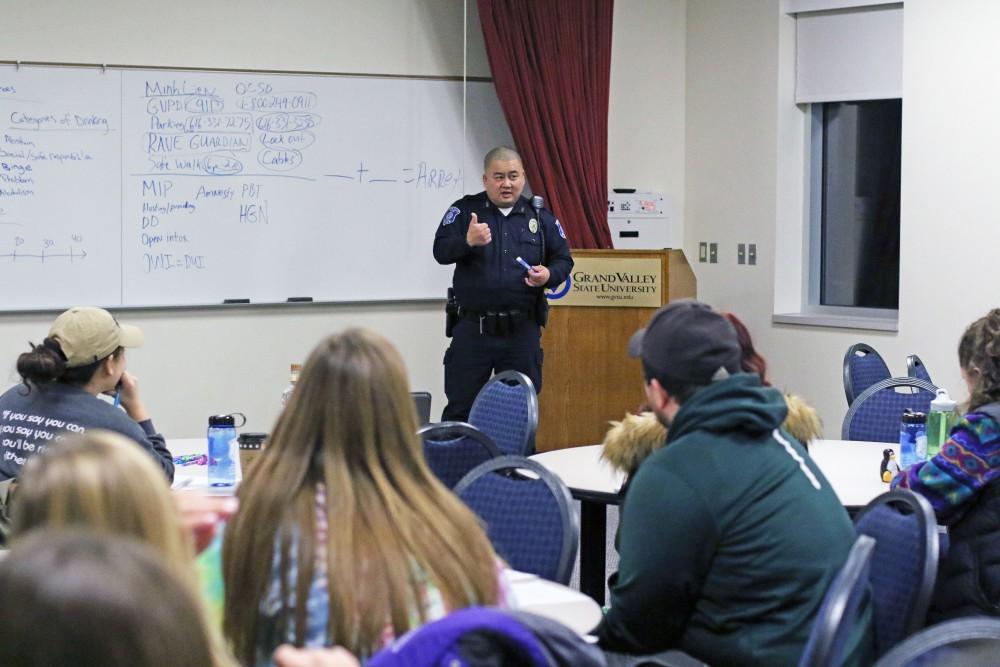National Alcohol Screening Day to combat risky drinking

GVL / Emily Frye Grand Valley’s Officer Min teaches a group of students about being safe with substances on Wednesday Jan. 25, 2016.
Apr 6, 2017
While college may seem like the perfect time to let loose and party with friends, many risks and dangers can accompany one night of fun. Before drinking that $14.99 bottle of spiced rum, officials warn Grand Valley State University students to pay attention to how they are drinking.
As part of National Alcohol Screening Day, the University Counseling Center will offer GVSU students the chance to take a confidential alcohol screening Thursday, April 6, on the Allendale and Pew Campuses.
Eric Klingensmith, assistant director at the center and coordinator of Crisis Intervention and Alcohol and Other Drugs Campus Education Services (ACES), said these services seek risk reduction around risky and binge drinking, alcohol poisoning, alcohol abuse and alcoholism.
“It gives a chance, especially for college students, to raise awareness,” Klingensmith said. “It allows the person in a short amount of time and fairly convenient way to have a conversation with a professional to possibly say there might be some issues here.”
When it comes to binge drinking, two major concerns both ACES and the Grand Valley Police Department (GVPD) has expressed concern for is alcohol poisoning and incapacitation.
According to the National Institute on Alcohol Abuse and Alcoholism, binge drinking accounts for four or more drinks within two hours for women, and five or more drinks within two hours for men.
In addition, it takes about one hour for the liver to metabolize the alcohol in one drink. The more consumed in a short period of time, the greater risk of alcohol poisoning.
“We are very concerned about alcohol poisoning,” said Brandon DeHaan, GVPD captain. “If a student consumes too much alcohol they could die.”
In this situation, DeHaan said the officer’s main concern is the health of the student. In 2012, the medical amnesty policy Gov. Rick Snyder enacted offered this safety to people underage facing alcohol or drug overdoses.
“If someone contacts medical help in this situation the police are not going to take law enforcement action, we would rather be notified of someone who is in crisis—alcohol poisoning truly is a crisis,” he said.
When binge drinking becomes a habit, alcohol tolerance can change as the user becomes more dependent on the substance. When the blood alcohol content (BAC) rises past .40 the user is at risk of death.
Ultimately, Klingensmith said the screening day serves as a warning to both medical and legal concerns to students. He said it works to eliminate these unhealthy drinking patterns.
“Over time when people start binge drinking it does change the tolerance,” he said. “When people drink, especially binge drink, and the more often they do it the more that risk goes up.”
When consuming alcohol, Klingensmith said students should pay attention to the signs of alcohol poisoning then contact medical help, as the BAC can rise even after the drinking has stopped.
“We don’t want to see students get into that pattern—unhealthy or illegal behaviors,” he said. “If you are going to, there are some responsible ways to drink. When an individual starts binge drinking, even if it is once in awhile, that can have some dangerous consequences.”
Faculty will offer screenings at the Fieldhouse on the Allendale campus from 10 a.m. to 2 p.m., and in the Kirkhof Center Lobby from 10 a.m. to 4 p.m. In downtown Grand Rapids, students can stop by the DeVos Building C and the Center for Health and Sciences Lobby from 10 a.m. to 2 p.m.
For more information about the programs for prevention, education, intervention and recovery offered by ACES, visit www.gvsu.edu/aces.





















